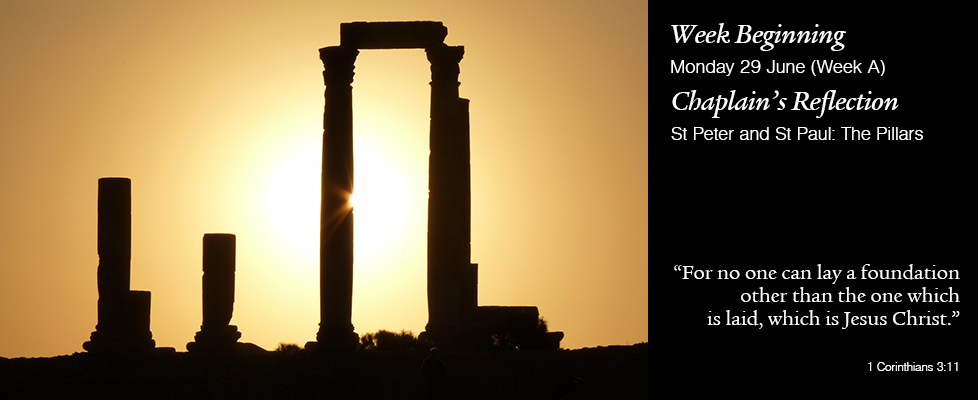These two apostles epitomise everything that is energetic and outward looking when it comes to evangelism. But they also epitomise a past littered with mistakes, denials and wrong choices. It would seem that is the way it should be, ordinary folk who succeed and fail in equal measure. Why? Because Jesus weaves in and out of their decision making.
Start with Paul, he was the most staunch of Pharisees, a man determined to rid the empire of this new challenge to Judaism. He had made it his life mission to torture and imprison Christians. He stood watch over the stoning to death of Christianity’s first martyr – St Stephen. His conversion comes around in dramatic fashion following the death of Jesus, with a vision asking him the question “Saul, Saul, why do you persecute me?” (Acts 9:4). It’s quite extraordinary that the New Testament attributes seventeen of the twenty seven holy books to St Paul.
He was a gifted and zealous scholar who know how to evangelise communities of non-believers. He knew how to harness the sins of his past life, the passion he’d put into persecuting Christians, and use it for forming communities based on foundations of love. He firstly acknowledging in a letter to Timothy who he was “the worst of sinners.” (1 Timothy 1:15-16), but then uses it to punctuate the next part of his life “I have fought the good fight, I have finished the race, I have kept the faith.” (2 Timothy 4:7). His missionary exploits took the Church far and wide across the Roman Empire and beyond. He knew his strengths and used them for spreading the Good News. I imagine today he would have been a wiz on social media and utilising YouTube and other video platforms. However, it was the face to face contact with Jesus that formed him. He became sure of his purpose and calling and became determined to succeed. He tells us in letters to the Ephesians, Romans and others time after time that we are all called to fulfil a purpose and live it out (Eph 2:10, Romans 8:28),
As for Peter – sometimes our Lord is predicting: “And I tell you, you are Peter, and on this rock I will build my Church.” (Matthew 16:18) or “I tell you Peter, this very night before the cock crows, you will deny that you know me three times.” (Luke 2:34).
Some of the time Jesus reprimands him or points him back in the right direction: “Get behind me, Satan! You are a stumbling block to me; you do not have in mind the concerns of God, but only human.” (Matthew 16:32) or when Jesus takes Peter, James and John up the mountain with him, and at the Transfiguration Peter decides to concentrate on earthly matters and building shrines in the vein of Jewish traditions. “Peter said, ‘If you wish I will put up three tents, one for you, one for Moses and one for Elijah.” (Matthew 17:4). In this instance the rebuke comes directly from above, with God categorically telling Peter, James and John to focus wholeheartedly on the Messiah that is right before their eyes and seize the blessing they’ve received, “A voice came from heaven saying, ‘This is my son, the beloved. Listen to Him!’” (Matthew 17:5).
Other times Jesus is seen to be validating or praising the responses and behaviour of Peter. At the time Jesus questions the disciples about ‘Who do people say I am?’, Peter responds with a phrase steeped in theological understanding. “You are the Messiah, the Son of the living God.” (Matthew 16:16). Jesus then goes on to use the famous phrase “You are Peter and on this rock foundation, I will build my Church.” (Mt 16:18). If you look at the chapter and verse numbers, you’ll see that interestingly all these differing conversations Jesus has with Peter are presented over the course of a couple of chapters. A final affirming quote comes from the discourse after Jesus’ resurrection, after reconnecting with the disciples and eating together, Jesus three times questions Peter about his love for him. But concludes the conversation by placing Peter back in his place of authority to spread the Gospel and build the Church. He simply ends with the same words their mission began with “Follow me!” (John 21:19).
Going back to the idea of pillars of faith, strength, rocks and foundations – all this imagery we come to associate with St Peter in particular, the American pastor, Phil Ware explores how solid ground should also be our roots:
Jesus tells us there is a place of solid ground. Jesus is at the enormous rock outcropping of Caesarea Philippi (Matthew 16:13-27). The events that happen there come during the heart of Jesus’ ministry to people in need and as he begins to shift his focus to strengthening his disciples’ faith. He is beginning to challenge them to believe in his identity as the Messiah and Son of God who will go to the cross as God’s servant. This is his future, but they can’t understand this, much less accept it!
Along with the events that happen around this time of confession, we also are given a clear picture of what can be our solid ground…a picture that has been proven true again and again over the years. Jesus asks his disciples a straightforward question upon which everything important in their lives will depend. Jesus then goes on to both compliment them and confront them. Let’s take a look at this very familiar, but often misunderstood moment in the life of our Lord.
Notice how Jesus begins: “Who do people say I am?”. While this is an important question, it means very little in comparison to the next question: “Who do you say that I am?”.
Ah! That’s the question of all question is it? We must answer this question correctly or we will build our lives on the sinkholes and shifting sands of lies, deceptions, and false foundations. Jesus asks them – and through them, Jesus asks us – “Who do you say that I am?”. Each of us must answer this question!
So on the feast day of St Peter and St Paul, listen to the words and example of these two pillars of the Church who lead us to the questions – “Are you seeking the purpose in life that God called you to?” and “Who are you saying that Jesus is?”
Mr M Robinson
Lay Chaplain




